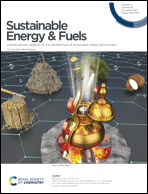Application of super-concentrated phosphonium based ionic liquid electrolyte for anode-free lithium metal batteries†
Abstract
Anode-free lithium batteries offer an excellent pathway to achieving a dramatic boost in energy density over current lithium-ion technology by eliminating the anode intercalation material during cell assembly. However, cycle stability remains a critical issue given that the inherent negative electrode capacity to positive electrode capacity ratio (N/P ratio) of ∼1 magnifies the performance effects of any coulombic inefficiencies in the lithium deposition/dissolution processes. Ionic liquid electrolytes have a demonstrated ability to support lithium metal cycling in lithium metal batteries through achieving high coulombic efficiencies. In this work, the phosphonium bis(fluorosulfonyl)imide super-concentrated ionic liquid electrolyte (3.2 mol kg−1) was cycled with high loading cathodes at 50 °C, representing the first report of an ionic liquid electrolyte being incorporated into an anode-free lithium battery. Li‖Cu half-cells yield a high coulombic efficiency of 99.4% with 100% excess lithium at 1 mA cm−2. The significance of substrate preparation was shown by performing a simple micro-patterning of the copper current collector which increased the capacity retention by 47.3% compared to cycling on plain copper foil in LFP‖Cu cells. The lithium deposits initially exhibited a columnar structure but gradually lost this preferred morphology due to the growth of a dead lithium network during cycling. Single crystal NMC 622 (4.6 mA h cm−2) cathodes were cycled in an anode-free full cell configuration to yield an average coulombic efficiency of 99.4% with 53% capacity retention after 100 cycles. These cells delivered an initial stack specific energy approaching 600 W h kg−1; over double that of current state-of-the-art lithium-ion batteries, at both high charge and discharge current density (1.75 mA cm−2). These results, among the best anode-free lithium cell results reported in the literature to date, indicate that the phosphonium bis(fluorosulfonyl)imide super-concentrated ionic liquid electrolytes are a promising candidate to support a high-performance anode-free cell chemistry.



 Please wait while we load your content...
Please wait while we load your content...